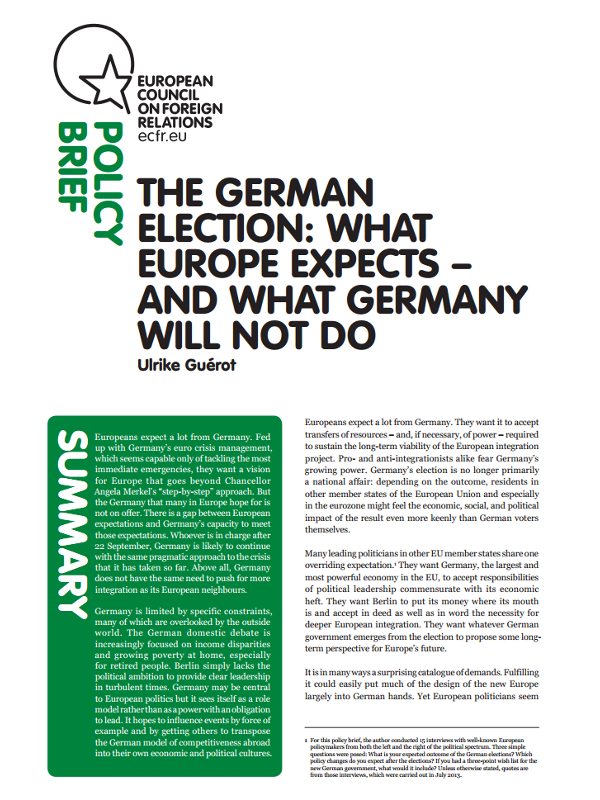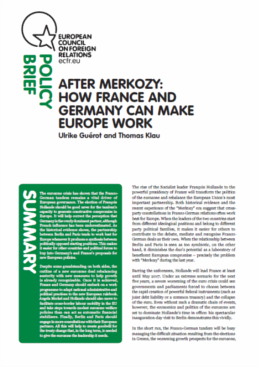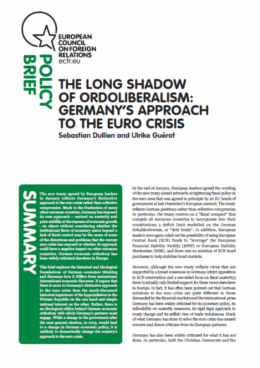Auf Deutschland kommt es an
A piece in German on Germany’s place in Europe

ECFR Alumni · Former Senior Policy Fellow
Ulrike Guérot used to work for ECFR as Senior Policy Fellow.
A piece in German on Germany’s place in Europe
The Icelandic application for EU membership is a little bit special: propelled by the economic crisis, the EU’s eagerness will annoy other potential accession states
The German Constitutional Court finally approved the Lisbon Treaty this week. But why was this necessary?
Financial crisis, the stalement created by the Czech presidency, the uncertainty surrounding Lisbon and EU institutions: there is certainly a lot on the Swedish Presidency plate
Europe’s traditional social-democractic parties are being challenged by the far right, says Ulrike Guerot in a piece in Spanish
Perhaps it is time for a new transatlantic forum, argues Ulrike Guerot
An article in Spanish on transatlantic relations
Following France?s return to NATO military command this week, relations between Paris and Berlin remain complex
In her review of the Munich Security Conference, Ulrike Gu?rot argues that the US reassured Europe of its commitment to a multilateral approach to foreign policy. But how visible, deep and quick will the change in transatlantic relations be?
This week?s Munich Security Conference offers a platform for transatlantic change. Ulrike Gu?rot discusses three necessary paradigm shifts.

Germany will not provide clear leadership for Europe
From our Reinvention of Europe series of National papers

Hollande and Merkel should launch an ambitious EU reform programme

The thinking behind Germany’s unpopular approach to the crisis
Understanding Berlin’s internal debates about its European role
How to help Germany rework its role as the keystone of Europe
With the pivotal change of leadership in Washington, the US and the EU may have an ideal moment to strengthen the US-EU institutional bond
Germany will continue to dissapoint the rest of Europe. Angela Merkel will remain cautious and resistant to grand plans, no matter how much Europeans want her to act.
Like Greece, Spain and Germany, Britain now faces a cathartic moment when it needs to decide what price it is worth paying to stay in the European Union: coolheaded rationality must prevail over emotion
On Thursday EU leaders will meet in Brussels to discuss the EU budget for the next seven years. ECFR experts in Spain, the UK, Bulgaria, Denmark, France, Germany and Italy tell us what to expect.
Germany and Poland have become close political allies. The future of the European Union may be decided in Berlin and Warsaw. But has Poland replaced France as Germany's most trusted European partner?
As part of the ’Reinventing Europe' project, ECFR is publishing a series of papers on the national debates within EU member states over the crisis and the future direction of Europe. The sixth paper in the series analyses the situation in Germany ahead of the Constitutional Court's crucial ESM verdict.
In its attempts to rescue the euro, Germany is often seen as the odd country out. However, what is seldom understood abroad is that the German position is about more than limiting its own fiscal exposure.
How does the EU summit look from Berlin, Madrid, Rome and Warsaw, and what are the expectations? Four of ECFR's experts tell us how they see the gathering of EU leaders and whether anybody should be optimistic about the outcome.
Understanding how Berlin thinks is now more important than ever. If EU leaders want Angela Merkel to listen to calls for growth, they first need to understand her economic mindset which is deeply rooted in a concept known as 'ordoliberalism'.
Germany has fallen out of love with Europe, and its customary role as the uncomplaining engine of the EU. But as other EU members question whether Germany is now ‘going it alone’, Berlin must answer questions about what Germany wants from Europe in the 21st century, and what price it is willing to pay for it.
Eine interessengeleite deutsche Europapolitik ersetzt zunehmend die historisch bedingte Symbiose zwischen Deutschland und Europa. Im post-romantischen Europa des 21.Jahrhunderts bestimmt sich Deutschlands Rolle neu – wie viel Europa darf es sein und was ist der Preis von Nicht-Europa?